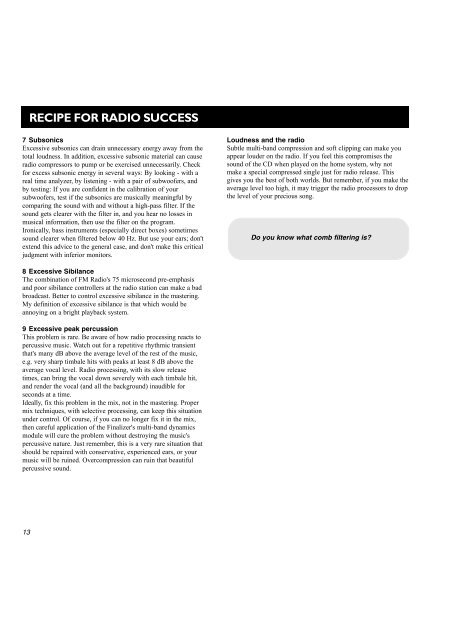2x4cdyD3b
2x4cdyD3b
2x4cdyD3b
Create successful ePaper yourself
Turn your PDF publications into a flip-book with our unique Google optimized e-Paper software.
RECIPE FOR RADIO SUCCESS<br />
7 Subsonics<br />
Excessive subsonics can drain unnecessary energy away from the<br />
total loudness. In addition, excessive subsonic material can cause<br />
radio compressors to pump or be exercised unnecessarily. Check<br />
for excess subsonic energy in several ways: By looking - with a<br />
real time analyzer, by listening - with a pair of subwoofers, and<br />
by testing: If you are confident in the calibration of your<br />
subwoofers, test if the subsonics are musically meaningful by<br />
comparing the sound with and without a high-pass filter. If the<br />
sound gets clearer with the filter in, and you hear no losses in<br />
musical information, then use the filter on the program.<br />
Ironically, bass instruments (especially direct boxes) sometimes<br />
sound clearer when filtered below 40 Hz. But use your ears; don't<br />
extend this advice to the general case, and don't make this critical<br />
judgment with inferior monitors.<br />
Loudness and the radio<br />
Subtle multi-band compression and soft clipping can make you<br />
appear louder on the radio. If you feel this compromises the<br />
sound of the CD when played on the home system, why not<br />
make a special compressed single just for radio release. This<br />
gives you the best of both worlds. But remember, if you make the<br />
average level too high, it may trigger the radio processors to drop<br />
the level of your precious song.<br />
Do you know what comb filtering is?<br />
8 Excessive Sibilance<br />
The combination of FM Radio's 75 microsecond pre-emphasis<br />
and poor sibilance controllers at the radio station can make a bad<br />
broadcast. Better to control excessive sibilance in the mastering.<br />
My definition of excessive sibilance is that which would be<br />
annoying on a bright playback system.<br />
9 Excessive peak percussion<br />
This problem is rare. Be aware of how radio processing reacts to<br />
percussive music. Watch out for a repetitive rhythmic transient<br />
that's many dB above the average level of the rest of the music,<br />
e.g. very sharp timbale hits with peaks at least 8 dB above the<br />
average vocal level. Radio processing, with its slow release<br />
times, can bring the vocal down severely with each timbale hit,<br />
and render the vocal (and all the background) inaudible for<br />
seconds at a time.<br />
Ideally, fix this problem in the mix, not in the mastering. Proper<br />
mix techniques, with selective processing, can keep this situation<br />
under control. Of course, if you can no longer fix it in the mix,<br />
then careful application of the Finalizer's multi-band dynamics<br />
module will cure the problem without destroying the music's<br />
percussive nature. Just remember, this is a very rare situation that<br />
should be repaired with conservative, experienced ears, or your<br />
music will be ruined. Overcompression can ruin that beautiful<br />
percussive sound.<br />
13


